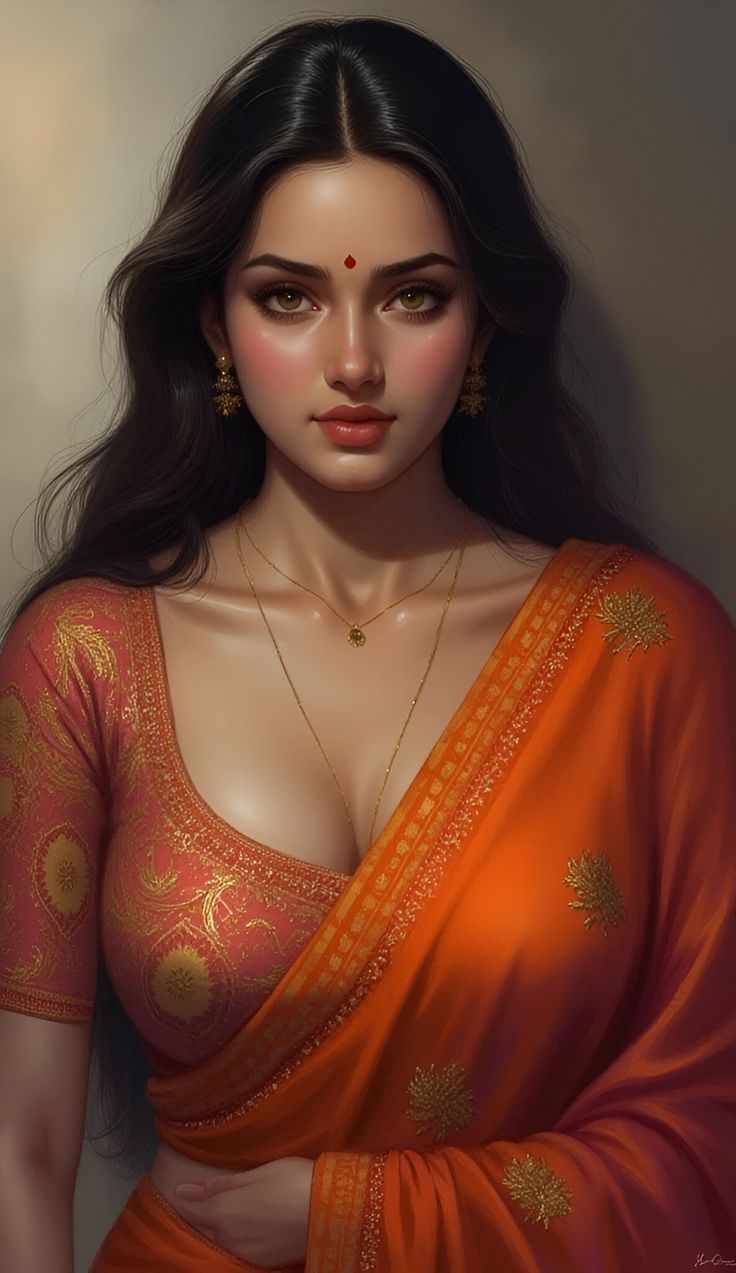
"Kya hua?" Mummy asked, rushing to him. "Hari, bolo kya hua?"
(What happened? Hari, tell me what happened?)
"Main haan keh diya," Papa said, and his voice broke. "Main kya karta? Karz maaf. Pachaas hazaar aur dega. Mohan ki padhai. Tumhari sehat. Main... main kya karta?"
(I said yes. What else could I do? Debts forgiven. He'll give fifty thousand more. Mohan's education. Your health. What else could I do?)
He looked at me then, and I saw everything in his eyes-shame, defeat, resignation.
The knowledge that he'd just sold his daughter to save his family.
"Saat din mein shaadi hogi," he whispered. "Sahib ne kaha-jaldi karni hai. Kal uski maa aayegi shagun leke."
(The wedding will happen in seven days. Sir said-it must be done quickly. Tomorrow his mother will come with the shagun gifts.)
I couldn't speak. Couldn't breathe. Seven days. In seven days, I would belong to him completely, legally, irrevocably.
That night, I didn't sleep. I lay on my mat and stared at the ceiling, counting down the hours until my life ended.
By the next afternoon, they had arrived. I heard the car long before it appeared at the gate.
Everyone in the mohalla poured outside, eyes fixed on him as he stepped out of the SUV.
A few villagers had drifted in as well, glaring and murmuring under their breath, their jealousy and envy almost palpable. Some people, recognizing who it was, backed away in fear and slipped quietly back into their homes.
He stepped out of the SUV,followed by a woman.
His mother. She was tall, almost as imposing as her son, wearing an expensive net saree that probably cost more than our house.
Her hair was pulled back severely, her face sharp and angular, her eyes cold and assessing.
She wore enough gold jewelry to feed our family for a year.
She looked at our house-our poor, crumbling cottage-and her lip curled in visible disgust.
Mummy had cleaned everything, swept the floors three times, borrowed ceramic cups from the neighbors. It didn't matter. We were still poor, and she made sure we knew she knew it.
"Namaste, malkin," Papa said, folding his hands respectfully. "Please, andar aayiye-"
(Namaste, ma'am. Please, come inside.)
She walked past him without acknowledging his greeting, her eyes scanning our home like she was inspecting a particularly disappointing purchase.
He followed her, and when his eyes found me standing in the doorway, something dark and hungry flashed across his face.
He smiled-that terrifying smile-and I felt naked despite being fully clothed.
I'd worn my best salwar kameez-the pale yellow one with white embroidery. I'd braided my hair. Put a small bindi on my forehead. Tried to look presentable. But the way he looked at me made me feel like I was wearing nothing at all.
"Haan, chai theek hai," she replied to something mummy asked. "But let's sit outside, no? The weather is nice."
(Yes, the tea is fine. But let's sit outside, okay? The weather is nice.)
Mummy quickly arranges cushions on the charpai in the courtyard. The cushions are borrowed from neighbors-I recognize the patterns.
His mother sits down with the careful precision of someone used to better furniture, adjusting her saree so it won't wrinkle.
Mummy brought out tea and sweets we'd borrowed money to buy.She lifted the cup delicately.
"Chai thodi zyada patli hai," she said in a neutral tone, almost apologetic.
(The tea is a little too thin.)
"Par koi baat nahi. Mijaz hi aisa hai mera."
(But it's alright. That's just how I am.)
Papa forced a smile. "Next time, malkin, hum-"
(Next time, ma'am, we'll-)
"Arre nahi, nahi," she interrupted mildly. "Main bas bol rahi thi. Tum log pareshaan mat ho."
(No, no. I was just saying. Don't get worried.)
Her voice was soft, but it carried the weight of a person used to better things - without having to say it aloud.
She turned to Devraj, still holding the cup between her fingers.
"Beta," she murmured, "tumne sab soch samajh kar faisla kiya hai na? Ghar... parivaar... sab dekh liya?"
(Son, you have thought everything through, haven't you? The house, the family, everything?)
Devraj's eyes were still on me. He hadn't looked away since he entered.
"Haan, Maa. Main ekdum pakka hoon. Yeh wahi hai jo main chahta hoon."
(Yes, mother. I am absolutely sure. This is exactly what I want.)
His mother sighed dramatically.
"Thik hai..Tumhari khushi mein hi meri khushi hain."
(Alright. Your happiness is my happiness.)
She snapped her fingers, and a servant I hadn't noticed brought forward a large tray covered with a red cloth. When the cloth was removed, I saw jewelry-heavy gold jewelry, silk sarees, cash in envelopes.
"Yeh sab tumhari beti ke liye," she said.
(This is all for your daughter.)She pulled out a heavy gold necklace and beckoned me forward with a sharp gesture.
"Aa, yahan aa." (Come here.)
I walked forward on trembling legs. Devraj's eyes tracked every movement, and I could see him shift slightly in his seat, adjusting himself.
His mother grabbed my chin, her fingers firm and unyielding, tilting my face upward as though she was checking a piece of grain for purity.
"Hmmm... rang zara dhup mein paka sa lagta hai," she murmured, voice smooth as silk but colder than winter water.
(Hmm... your skin looks a little sun-kissed.)
"Maa, mujhe yeh rang perfect lagta hai," Devraj said, his voice thick.
(Mother, I think this skin tone is perfect.)
His eyes were on my lips as he said it, and I knew he was thinking about what happened in the kitchen, about his thumb forcing its way into my mouth.
After what felt like hours of painful small talk and his mother's casual cruelty toward my parents' poverty, Devraj finally spoke up.
"Maa, aap chai pee lo. Main Meera se kuch baat karna chahta hoon. Private."
(Mother, you have your tea. I want to talk to Meera privately.)
The room went silent. Mummy's face went pale."Saahib, woh-ladki hai, shaadi nahi hui abhi-" Papa tried weakly.
(Sir, she's-she's a girl, we're not married yet-)
"Toh?" His mother cut in sharply. "Abhi toh hone hi wali hai. Aur mera beta kuch galat thodi na karega. Let them talk."
(So? It's going to happen soon anyway. And my son won't do anything wrong. Let them talk.)
He stood, his massive frame unfolding.
"Andar kamre mein. Bas dus minute."
(Inside the room. Just 10 minutes.)
It wasn't a request.
Papa looked defeated. Mummy looked terrified. But neither of them could say no. Not to Devraj. Not when his mother was sitting there with a small fortune in shagun that had already been accepted.
"Ji, sahib," Papa whispered.(Yes,sahib)
Devraj extended his hand toward me.
"Chal, Meera."
(Come, Meera.)
My legs don't feel like they belong to me. I stand on them, but they're not mine. Nothing is mine anymore. Not my body. Not my choice. Not even the air in my lungs.
I walk toward him. Every step is a betrayal of myself. Every step brings me closer to something I can't escape, something that's already claimed me, something that's written itself into my future with permanence ink.
He doesn't touch me as I walk past him-not yet. But I can feel his eyes on me, feel his anticipation radiating off his skin like heat from a fire. I can smell him-cologne and sweat and something darker, something primal that makes my skin crawl.
The moment the door closed behind us, everything changed.


Write a comment ...